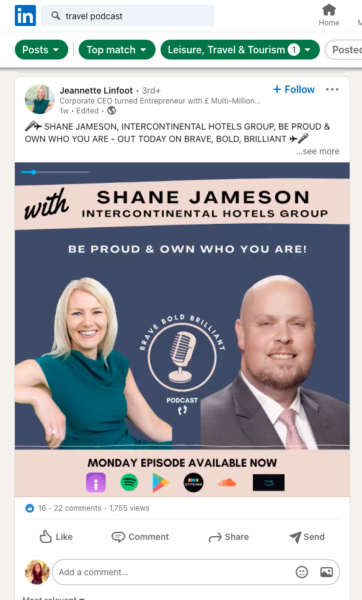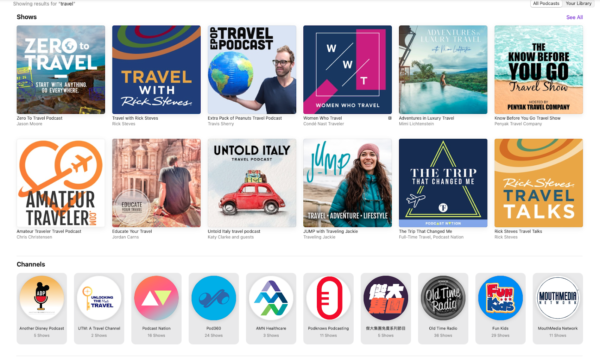
I joined the international podcast audience relatively late — and immediately wondered why I had waited so long. Podcasts are amazing. They’re perfect for chores or car rides, and they don’t leave you at the mercy of a radio host — you pick the episodes you want to listen to.
So, I have to ask: Have you considered podcasting for small business?
Most of my friends were much quicker on the uptake than I was. In fact, much of America beat me to the punch. More than half of the U.S. population has listened to a podcast.
The audience is there. And in an ad-saturated culture, more of your marketing success relies on creating content that people choose to consume: videos, blog posts, funny memes, and so on. You want to reach your audience in the right context and right frame of mind.
The best part is that it’s easier than you may imagine. You don’t need sophisticated equipment or extensive training. All you need is an idea and a little know-how.
The benefits of podcasting for small business
A successful podcast requires some time and effort on your part.
Here’s why it’s worth it:
Improve your website with additional content and better SEO
We live in a content-hungry society. People constantly want more from the channels and sources they prefer. That’s one reason blogging for business is such a good idea.
Podcasting not only gives you a new format for publication but also enables you to repurpose content between media and channels. You can create blog posts based on interviews or distill old posts to create a new episode.
Having multiple formats allows people to choose their own adventure. You give them options for engaging with your brand.
Podcasts are also a smart strategy for search engine optimization (SEO). By sharing your episodes through social channels such as LinkedIn, you improve your website’s visibility in search engine results.

You can improve your SEO even more by building backlinks to your site. Ask guests to link to their episode on their own sites.
Increase brand awareness and brand authority
Podcasting can help you promote brand awareness, too. You gain access to new audiences and get your name out, introducing you to new listeners or reintroducing you to your audience.
Your content also allows you to improve your brand’s reputation as an authority in your industry. Use your podcast to display your expertise with thoughtful interviews, how-tos, and increased topic coverage.
Connect with your audience
A podcast is a great way to humanize your brand. You can reach out to potential customers in your own voice, creating more personal connections with your audience.
Listening to someone feels more intimate than reading their work. You give people an opportunity to know you better and build trust.
Get free insights and build your professional network
Podcasting for small business is great for networking. You can form new relationships and learn new lessons from your guests along the way.
Podcasts allow you to connect with experts by inviting them to be guests on your show. Instead of you paying for their time, they gain the benefit of exposure, while you benefit from their professional insight.
You can also use your podcast as an excuse to reach out to people. Even if they say no, you’ll have established that crucial first contact.
The steps in creating a podcast
Now that you know why podcasts are great for small businesses as well as their listeners, here’s how you can get started with your own podcast.
1. Pick your topic
Define your concept and your audience as specifically as possible. What aspect of your business do you want to talk about, and who will want to listen to it? What differentiates you from similar podcasts and their producers?
Be specific, but not narrow. It would be hard to sustain a podcast on the best museums in New Hampshire for many episodes. Nor could you expect to attract a large audience of New Hampshire-bound museophiles. A podcast on lesser-known U.S. travel destinations for budget-conscious tourists might be more successful.

2. Outline your format and commitment
You need to determine:
- The length of your episodes
- How frequently you’ll post new content
- The type of material you want to include: interviews, narratives, overviews, round tables, etc.
In addition, you’ll want to outline responsibilities if more than one person is contributing to the podcast.
3. Set up your platform, tools, and space
It’s time to get technical. Podcasting for small business requires you to pick your tools, your recording and editing software, and a hosting platform to store your episodes and create your feed.
You can record yourself using your phone, but it may be worth it to invest in a mic and headphones. Then set up your recording space where you can control noise levels and other disturbances.
Once you have everything in place, practice.
4. Start creating content
Don’t worry if your first couple of episodes are rough. You’ll learn by doing, and the faster you get started, the sooner you’ll get better.
But you can — and should — delay your launch until you have a handful of strong episodes for listeners to consume.
Some tips for growing your podcast
Once you’ve started your podcast, it’s time to nurture it and watch it grow. Here are a few ideas to help you promote your podcast.
Make use of promotional excerpts and transcripts
For every episode, create a teaser to post on social media. Because most social media platforms are visual, add graphics — a few slides of eye-catching images. Tag your podcast and tell people how they can get the full episode.
Transcripts are also important. Providing material for the hearing impaired is socially conscious and good for SEO. Google can scan written material to pick up on keywords.
There are several ways to create and display transcripts. Depending on your time, budget, and priorities, you can:
- Generate a transcript yourself
- Use an automated service
- Pay someone to do it for you
You then can paste it on the page or attach a file. The truly ambitious can even synchronize the transcript with the audio.
Book the right guests and appear as a guest on other podcasts
When podcasting for small business, you need to pick guests who will intrigue your target audience. You won’t be able to land the big names of more established podcasts — at least not at first — but choose people with the right credentials or a perspective that has proven to attract interest.
You should also offer to appear on other podcasts, gaining exposure and access to a whole new audience. There are a couple of free services — such as MatchMaker and RadioGuestList — that match podcasts and guests. Use them to find guests and to become one.
Make some noise
Don’t keep your podcast a secret! Let your digital marketing channels work together. Announce your launch through your email lists, social media accounts, and website. Get the word out to everyone you can.
Start talking, and people will listen
There you have it. Reasons to start podcasting for small business include the connections you’ll make with your audience and other professionals, the brand awareness and authority you’ll gain, and the proven value of producing quality content.
And you don’t have to be a radio pro to do it. Creating and promoting a podcast may take some practice, but it doesn’t require expensive equipment or fancy credentials.
So the question is: What do you have to say?
Make a list of all the topics you want to cover — either learning more about them or sharing previous expertise. Then ask yourself: What connects these topics? The answer is the theme of your podcast.




